Palantir’s direct listing has been poorly received by the press, and that negativity could present an investment opportunity.
Their negativity is likely due to Palantir’s controversial activities. Their sales execution and margins are in line with their enterprise software peers, and the commercial space is mostly untapped.
Palantir has 3 distinct themes for differentiation and growth, which I’ll explain in detail.
- Finding the “psycho-logical” instead of the “logical”.
- Positioning themselves for a fragmented global economy.
- Onboarding commercial salespeople who are just hitting their stride.
When you contrast Palantir’s execution with their perception, it’s obvious that politics must be in play. If this perception drags Palantir’s valuation down, investors could find value in an otherwise frothy software space.

What Does Palantir Do?
Palantir builds intelligence software. They started with the intelligence community in the United States to assist in counterterrorism investigations and operations, and eventually expanded to commercial enterprises.
Their principal software platforms are Palantir Gotham & Palantir Foundry. Here’s a quick shortcut for delineating the two.
Gotham = Government
Foundry = Commercial
“Logic” vs “Psycho-logic”
Palantir’s primary differentiator is that their software is not packaged. They are not selling commoditized software to address standardized needs. Palantir calls this differentiator “alpha” vs “beta”, and I’ll call it “logical” vs “psycho-logical” in a nod to my favorite 2019 book.
Most software is universal, making companies who use them similar, not different. By focusing on these commoditized ideas, the best case for businesses is catching up. These “logical” ideas are comforting, because most of your competitors are doing the same thing.
But before you’re sold on the “logical”, ask yourself, was Bill Gates logical when he wanted a personal computer on every desk in every home in 1980? What about Reed Hastings at Netflix when he went head to head against Blockbuster?
This is the major point of the book Alchemy. The author argues that in order to win, businesses must do the “psycho-logical”.
Imagine that you are sitting in the boardroom of a major global drinks company, charged with producing a new product that will rival the position of Coca-Cola as the world’s second-most-popular cold nonalcoholic drink.
How would you respond? The first thing I would say, unless I were in a particularly mischievous mood, is something like this: “We need to produce a drink that tastes nicer than Coke, that costs less than Coke, and comes in a really big bottle so people get great value for money.”
What I’m fairly sure nobody would say is this: “Hey, let’s try marketing a really expensive drink that comes in a tiny can…and tastes kind of disgusting.” Yet that is exactly what one company did. And by doing so, they launched a soft-drink brand that would indeed go on to be a worthy rival to Coca-Cola. That drink was Red Bull.
That’s what Palantir does. They make data easy to join and interact with, which allows businesses to find the “psycho-logical” insights that no other business has realized. This creates truly differentiated alpha, and is not possible with packaged software.
The same is true for defense and intelligence. It was “logical” for Osama Bin Laden to hide in a cave in Afghanistan. Instead, he was living in an upper-class mansion in Pakistan. Terrorism is truly psychological. The best ideas, as we have unfortunately experienced, are the ones that nobody saw coming. Palantir helps detect those events before they occur.
Palantir Gotham
You may recognize the name Gotham, Palantir’s first software platform. It’s a nod to the city Batman protects, but the concept is more like Bruce Wayne’s Batcave, where he uses tech to find the villains. In all fairness, “Gotham” is more marketable than “Batcave”.

Gotham identifies patterns hidden deep within datasets, essentially hunting for needles in thousands of haystacks. Their software famously helped the United States find Osama Bin Laden back in 2011.
When I said Gotham is generally used for government, I do mean generally. Financial services and other commercial customers may also use the product.
Several services comprise Gotham. I’ll highlight the top products, and you can reference their S-1 for the rest.
Graph
Graph is a whiteboard interface, allowing users to explore, visualize, and interact with entities, their properties, and their networks.

Gaia
Gaia is a shared live map where users can plan, execute, and report on operations. Everyone has real-time data and can act on the same information.
Additionally, users can drag and drop objects from other Gotham applications directly into Gaia so that planning and intelligence gathering happens in concert with analysis.
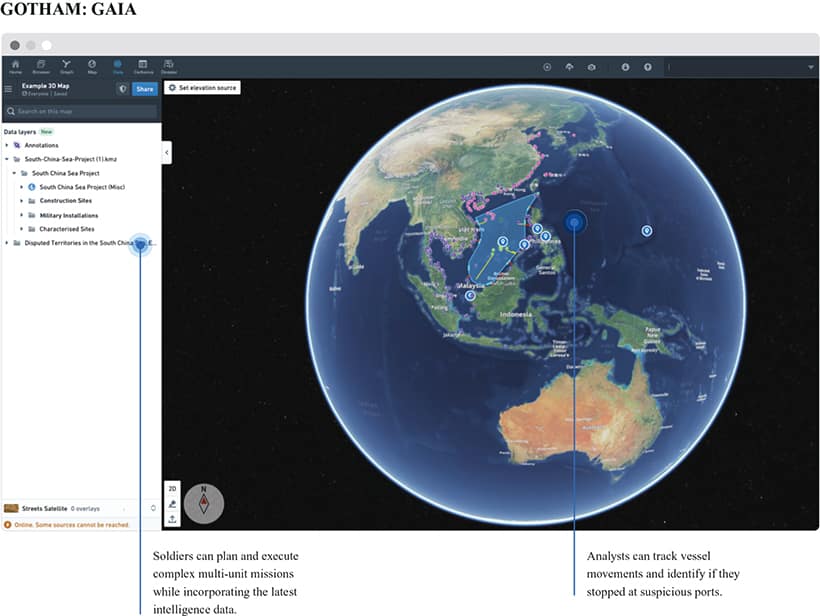
Video
Video interacts with both streaming and historical video data from a range of formats. Users can review video footage in the platform as well as enhance raw footage with geospatial information and overlays based on other data sources.

Ava
Ava is Palantir’s Siri. It is an artificial intelligence system that can scan billions of data points, identifying patterns and connections that would be missed by the human eye.
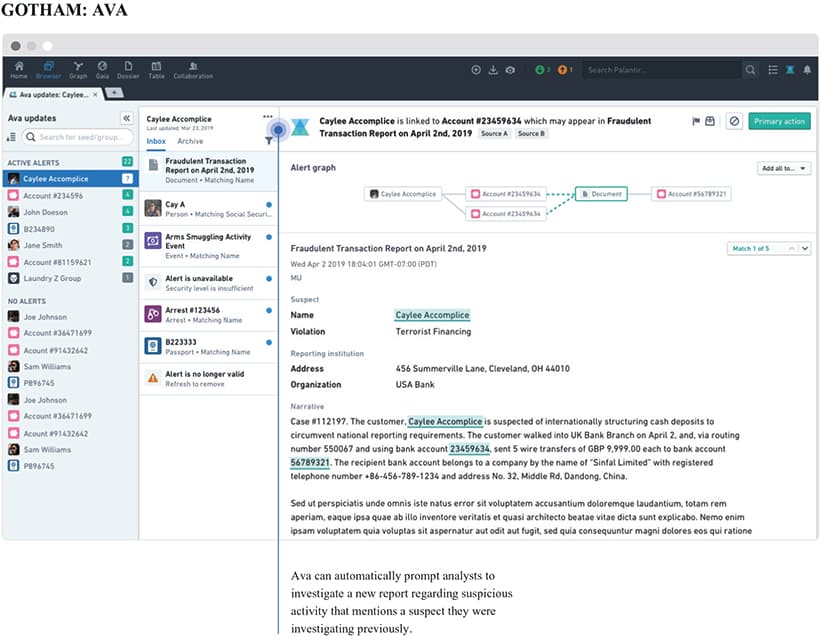
Palantir Foundry
Foundry was developed for the commercial sector. Like the public sector, private enterprises are also looking for “psycho-logical” ideas that nobody else has realized, instead of the turnkey “logical” that everyone else is doing.
Monocule
Monocle helps users understand and manage data lineage in Foundry using a graphical interface. Users can explore upstream dependencies or downstream consumers of data in Foundry, as well as trace logic for a dataset back to its source.

Object Explorer
Object Explorer helps users interact with data represented as objects, instead of rows in a table. Users may search across indexed data and traverse connections between objects.

Vertex
Vertex is a virtualization engine for supply chains. Imagine simulating changes or “what if” analyses before making any actual changes to your supply chain, and the ROI pencils out fairly quickly.
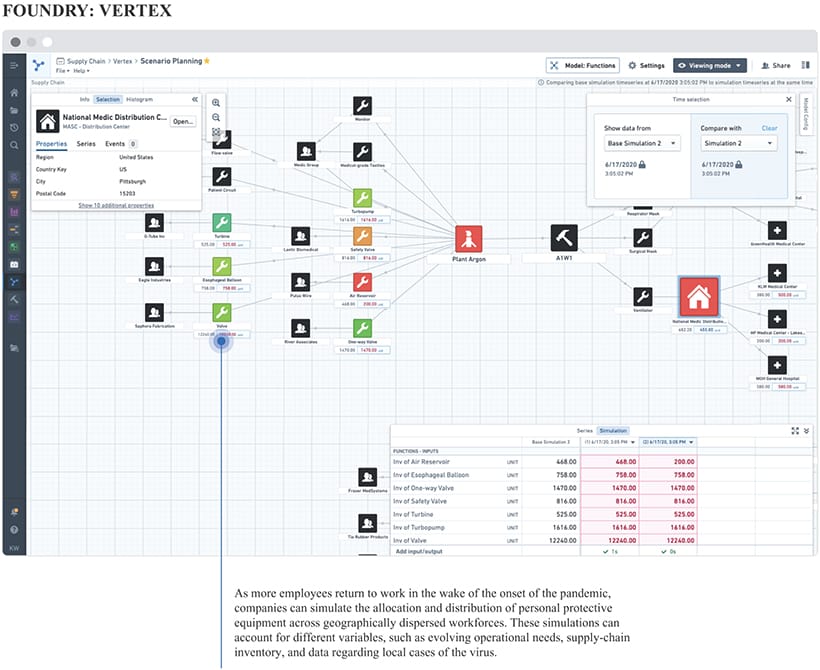
Palantir’s Execution
Now, we have spent enough time on Palantir’s business and their story. The real question is, how have they executed over the past 12 years?
Gross Margin: 67%
YOY Revenue Growth: 49%
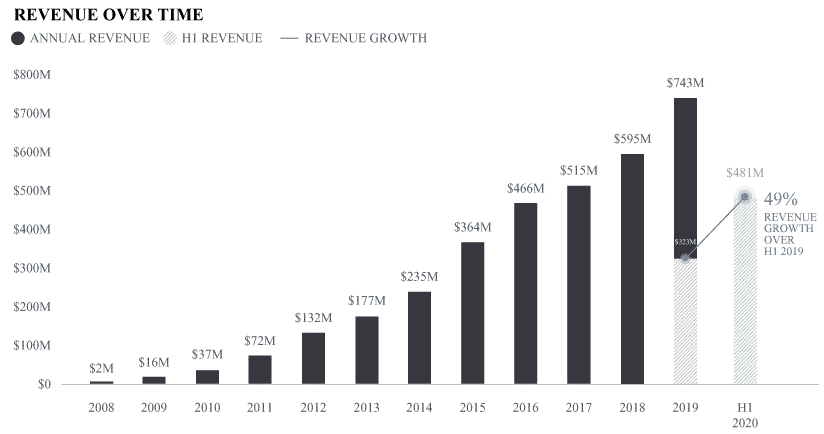
Looking at these numbers, I would say, “pretty well”. Palantir may not have the hockey stick growth of their peers like Crowdstrike or Alteryx, which reiterates the difficulty of procuring and implementing their software. It may take longer, but the insights could be worth it.
You may have noticed something else – revenue slowed down in 2016, and picked back up after 2018.
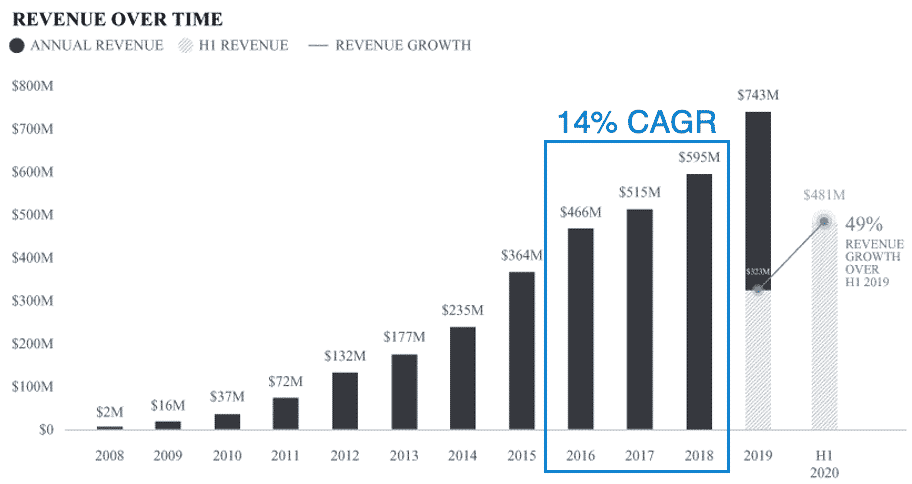
Palantir noticed this as well. They missed sales targets in 2017, which was likely due to Palantir not using salespeople to negotiate their contracts. As the WSJ wrote in 2018.
Mr. Karp would tell staff, in a nod to Palantir’s engineering roots: “We are not going to have any f—ing salespeople.”
Instead of salespeople, Palantir sent so-called forward-deployed engineers to meet potential clients. Some engineers answered skeptical questions from business prospects by suggesting companies simply plug their data into Palantir’s software and wait for it to spit out results—a suggestion some took as aggressive and presumptuous.
After those sales targets were missed, Palantir changed course and and invested in their sales team in 2018. As you can see, their revenue shot up soon after. As they explain in their S-1.
We expanded into the commercial sector in recent years. In 2019, 53% of our revenue came from commercial customers and 47% came from government agencies.
We have also expanded significantly outside the United States. In 2019, we generated 40% of our revenue from customers in the United States and the remaining 60% from customers abroad.
These salespeople have not only ramped up sales, they improved margins as well. Palantir’s contribution margin has increased from 14% in Q1 2019 to 55% in Q2 2020.
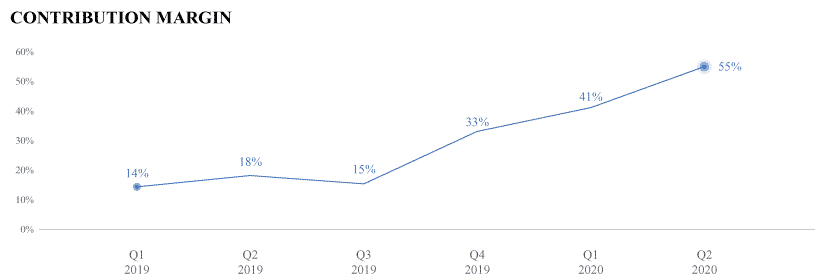
In summary, Palantir’s salespeople are selling more stuff for higher prices. The fact that these salespeople are relatively new to the party points to a key opportunity for future growth.
If Palantir was raising capital, I believe they would push this point home harder. Since they are not, this could give investors an opportunity.
Negativity Around Palantir’s S-1
If you have been living under a rock over the past several years, and simply read Palantir’s S-1, you might think this is a good business.
The press, however, disagrees. Pivot’s September 4th Podcast had the following exchange between Kara Swisher & Scott Galloway.
Kara Swisher: You know we need to do? We need to WeWork this puppy.
Scott Galloway: They spent $500 million on marketing, they overpay themselves like there’s no tomorrow, but claim they’re socialists. I don’t know where to start on this.
Kara Swisher: Let’s make this one of our narratives, I feel like we should, let’s make investors aware of this situation.
Quick clarification, Palantir spent $450 million on sales and marketing, not just marketing. This represents 61% of Palantir’s revenue.
Now, what “situation” is Kara referring to? How is a software company with 67% gross margins similar to a real estate company with negative gross margins like WeWork? After pulling their IPO, WeWork warned that they could be out of cash by early 2020. Palantir, on the other hand, isn’t even raising capital. All they are doing is making their shares publicly traded on the NYSE.
Let’s turn to ProfG. Which, if anyone has read my previous writings, knows that I’m generally a fan.
Is Scott Galloway normally this bearish on pre-profit companies that spend 61% of their revenue on sales and marketing? Well, he certainly wasn’t with Lemonade, which spent 133% of their revenue on sales and marketing.

In all fairness, insurance is different from enterprise software. Is Palantir an outlier for enterprise software IPOs?
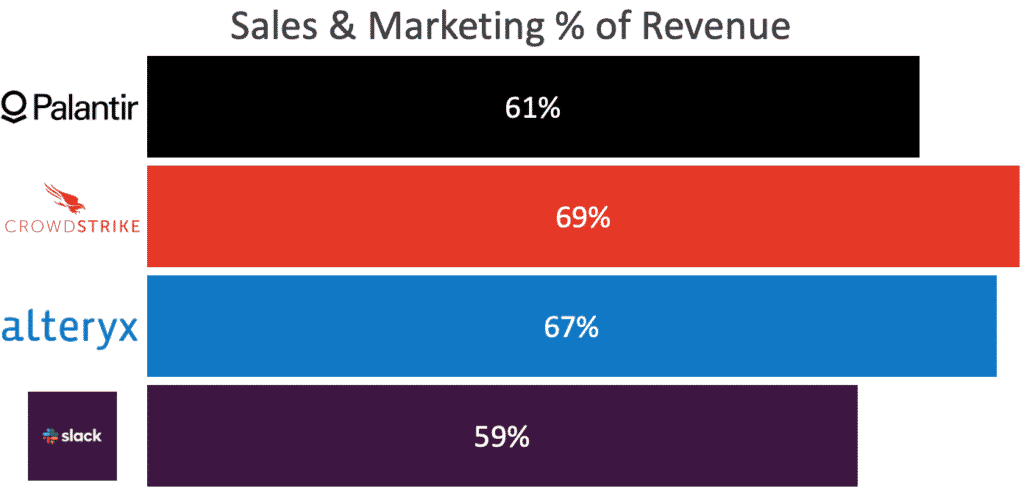
Compared to their peers, Palantir’s sales and marketing costs don’t look egregious whatsoever. It turns out that the customer lifetime value for software is incredibly high, which is why most software companies invest so much on growing their revenue.
It hasn’t been just Kara & Scott, many negative headlines have been released since Palantir’s S-1 was leaked. This is what I found by simply typing “Palantir” in Google News.
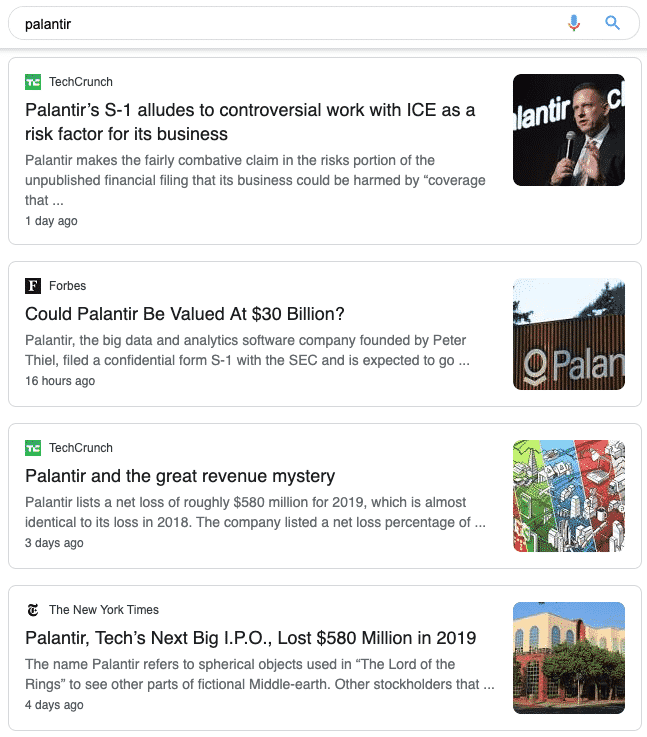
These articles disagreed with what I saw by just glancing at Palantir’s S-1. Before my analysis, I quickly asked Twitter what I might be missing, and here was the first response.
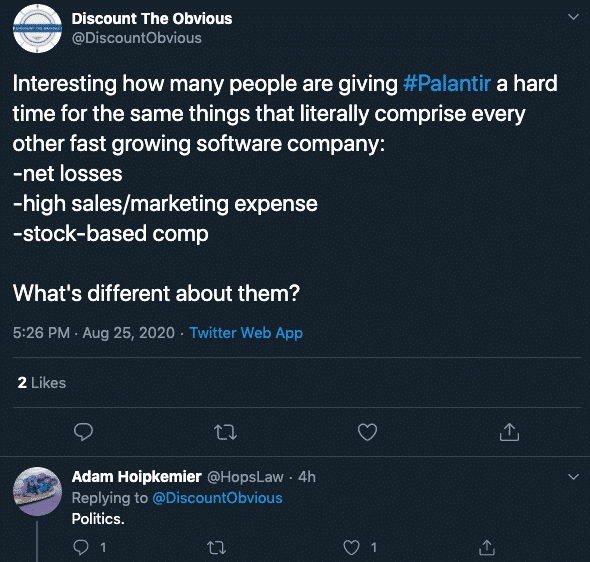
Palantir & Politics
Frankly, I don’t know what else it could be. Palantir is accelerating revenue, improving margins, and has a clear runway in their government and commercial spaces.
Those “politics” likely stem from Palantir’s controversial practices.
- Palantir’s software is used for immigration enforcement
- Palantir enables law enforcement to track people and families
- Palantir admits that their software is used to kill people
Each of these points are worth a discussion, and we’ll save that for a site that isn’t about investing. Instead, I will simply state the obvious. Palantir is following the laws of a democratically elected government. If we truly have a problem with these practices as citizens, we can, and should, vote out the politicians who are behind these initiatives.
Palantir’s perception is disappointing, as someone who supports democratic governments. Palantir is explicit with who they do business with.
We generally do not enter into business with customers or governments whose positions or actions we consider inconsistent with our mission to support Western liberal democracy and its strategic allies. Our decisions to not enter into these relationships may not produce the long-term financial benefits and results that we expect, in which case our growth prospects, business, and results of operations could be harmed.
Although we endeavor to do business with customers and governments that are aligned with our mission and values, we cannot predict how the activities and values of our government and private sector customers will evolve over time, and they may evolve in a manner inconsistent with our mission.
More importantly, Palantir is explicit with who they do not do business with.
We do not work with the Chinese communist party and have chosen not to host our platforms in China, which may limit our growth prospects.
Our leadership believes that working with the Chinese communist party is inconsistent with our culture and mission. We do not consider any sales opportunities with the Chinese communist party, do not host our platforms in China, and impose limitations on access to our platforms in China in order to protect our intellectual property, to promote respect for and defend privacy and civil liberties protections, and to promote data security.
Our decision to avoid this large potential market may limit our growth prospects and could adversely impact our business, results of operations, and financial condition, and we may not compete successfully against our current or potential competitors who choose to work in China.
Now for the ultimate question. Is saying that Palantir is “simply following the laws of a democratically elected government” a cop-out?
If it is, let’s contrast Palantir with brands who are working with China.
- Apple claims “privacy is a fundamental human right” while also helping the Chinese Communist Party track the Uighurs in China.
- Zoom blocked a US citizen’s account who organized a commemoration of the 1989 Tiananmen Square massacre.
- YouTube deleted comments that were critical of the Chinese Communist Party.
- LeBron James claimed Daryl Morey’s retweet supporting Hong Kong’s protesters was misinformed.
Somehow, journalists have not been remotely as critical to these brands, despite their obvious support to the Chinese Communist Party.
In all fairness, this is difficult to manage. Those brands must respect the laws of a local government, or face the consequences of billions in lost revenue. If Apple did not help China track the Uighur people, of which 3 million are in concentration camps, their supply chain would be kneecapped in a heartbeat.
This struggle is also the point. Palantir is also respecting the laws of their local government, while not compromising their values by supporting totalitarian governments. They drew a line in the sand about who they support, which are “Western liberal democracy and its strategic allies”, and will not compromise these values for the sake of revenue.
Palantir Is Ready for a Fragmented World
Palantir makes it clear where their loyalties lie in their S-1, which will be critical as the world becomes more fragmented.
This is not something I hope for, but it seems inevitable. John Garnaut, a former journalist in China and current authority on Chinese elite politics and Chinese Communist Party influence and interference, wrote the following in a 2019 essay.
The key point about Communist Party ideology – the unbroken thread that runs from Lenin through Stalin, Mao and Xi – is that the party is and always has defined itself as being in perpetual struggle with the “hostile” forces of Western liberalism.
Mr Xi did not invent this ideological project but he has hugely reinvigorated it. For the first time since Mao we have a leader who talks and acts like he really means it.
We have already seen cracks in our global relationship, and I wrote about the potential consequences in Chinese Delistings, We’re Missing The Obvious.
If the nuclear option isn’t reasonable, how else could China retaliate? Simply put, the obvious way.
They’ll go after United States companies doing business in China.
Palantir will not be exposed to this threat. While Apple, Starbucks, and Tesla have pinned their growth and operations on the Chinese economy, Palantir will only work with democracies. This means, if the world continues fragmenting, Palantir will have nothing to worry about. In fact, they are set up for success. Palantir is skating where the global puck is going.
Aside from that, Palantir kickstarted growth by adding salespeople, and has a ton of opportunity left in the commercial space. I believe the negative headlines could make Palantir undervalued, and will seize on this investment if that happens.
Regardless of being a potential shareholder, as a supporter of democratic governments, I am happy that Palantir is on our team, instead of our enemies.